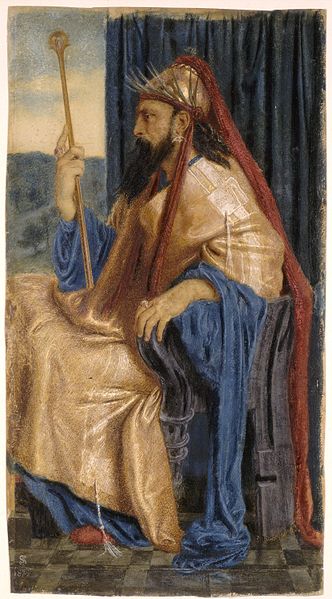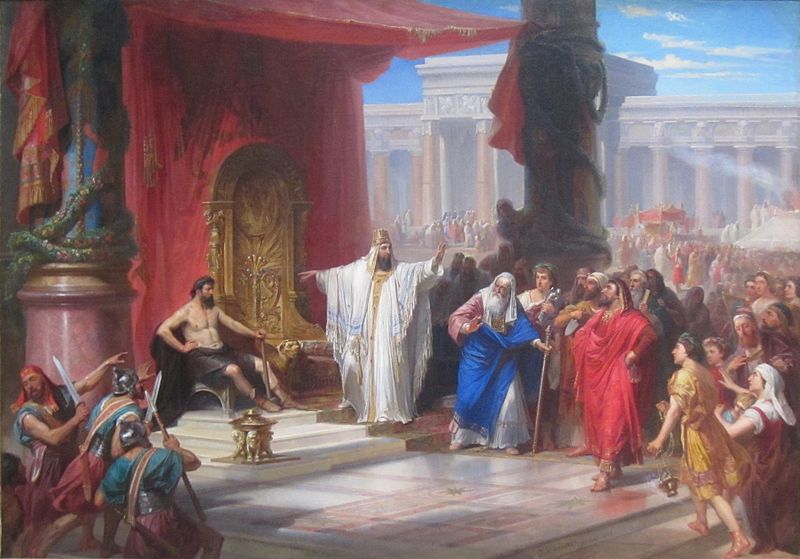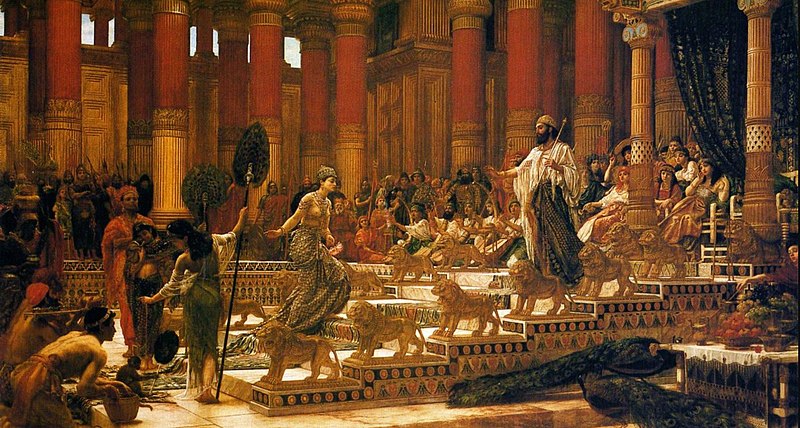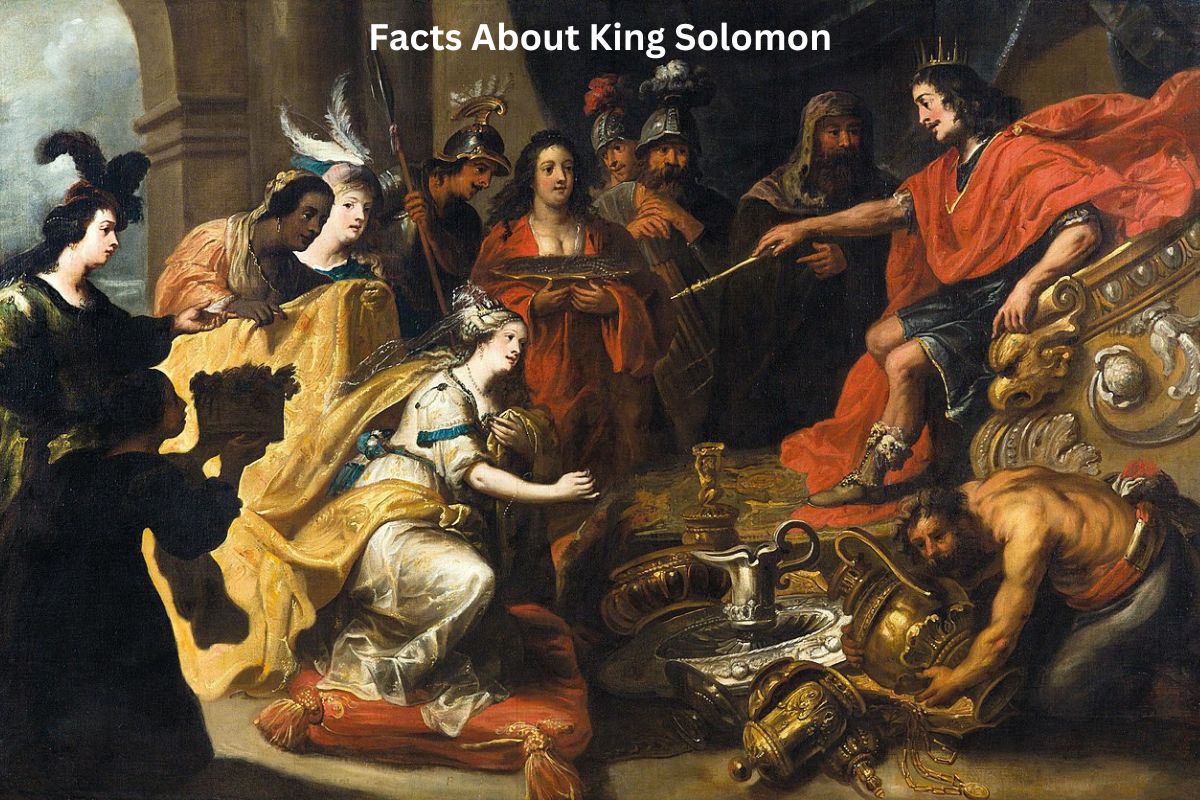King Solomon, a prominent biblical figure, reigned as the third king of Israel around the 10th century BCE. Known for his legendary wisdom, he is celebrated for constructing the First Temple in Jerusalem, a symbol of Israel’s devotion to God.
Solomon’s reign was marked by wealth, prosperity, and alliances, including a significant partnership with King Hiram of Tyre.
He authored biblical texts, such as Proverbs and the Song of Solomon, leaving a lasting legacy in literature and wisdom teachings.
However, his later years saw his kingdom’s decline, leading to its division into the northern Kingdom of Israel and the southern Kingdom of Judah, shaping the course of ancient Israel’s history.
King Solomon Facts
1. Third king of Israel
King Solomon was the third king of Israel, following King Saul and his father, King David. He ascended to the throne around the 10th century BCE after the death of his father, David. His reign marked a period of great significance in the history of Israel.

2. Built the First Temple in Jerusalem
One of Solomon’s most notable achievements was the construction of the First Temple in Jerusalem. This temple, often referred to as Solomon’s Temple, was a magnificent and central place of worship for the Israelites.
Also Read: Solomon’s Temple Facts
It was built on Mount Moriah and was considered the dwelling place of God’s presence on Earth. The construction of the Temple was a major undertaking, involving skilled craftsmen, laborers, and resources from various sources, including a partnership with King Hiram of Tyre.
The Temple’s completion was a symbol of Solomon’s dedication to God and his commitment to the worship of Yahweh in Israel.
3. Renowned for his wisdom
King Solomon is famous for his extraordinary wisdom, which is prominently showcased in the Bible. According to the biblical account, God appeared to Solomon in a dream shortly after he became king and offered to grant him any request.
Solomon asked for wisdom to govern the people of Israel wisely. God was pleased with his request and granted him not only wisdom but also wealth and honor.
Also Read: Facts About David and Goliath
Solomon’s wisdom became evident in various ways, such as his wise judgment in the well-known story of two women claiming to be the mother of the same child.
His wisdom was admired not only within Israel but also in neighboring nations, leading to alliances and the exchange of gifts with other rulers.

4. Period of wealth and prosperity in his reign
Under the reign of King Solomon, the Kingdom of Israel experienced a remarkable period of wealth and prosperity. This prosperity was largely due to Solomon’s administrative skills, wise governance, and strategic alliances.
Solomon established trade partnerships with neighboring nations and established lucrative trade routes that brought wealth and valuable resources to his kingdom.
The Bible mentions that silver and gold were so abundant during his reign that silver was considered as common as stones, and cedar wood from Lebanon was used extensively in his building projects. This economic stability and prosperity allowed the kingdom to flourish culturally and economically.
5. Author of Proverbs in the Bible
King Solomon is traditionally attributed with writing many of the biblical Book of Proverbs. Proverbs is a collection of wise sayings and practical advice for living a virtuous and righteous life.
These proverbs cover a wide range of topics, including wisdom, morality, justice, and the importance of fearing the Lord. They are known for their timeless wisdom and have had a profound influence on both biblical and secular literature.
6. Author of Song of Solomon in the Bible
Another book attributed to King Solomon in the Bible is the Song of Solomon (also known as the Song of Songs). This poetic and romantic book is a collection of love poems and songs that celebrate the beauty of love and desire.
It is often interpreted allegorically as a representation of the love between Christ and the Church in Christian theology. However, it is also appreciated for its literary and romantic qualities and is considered one of the most beautiful and evocative pieces of love poetry in the Bible.

7. Constructed his royal palace and fortified cities
In addition to the construction of the First Temple, King Solomon undertook various building projects throughout his reign. He constructed a magnificent royal palace in Jerusalem, which served as his residence and a symbol of his wealth and power. This palace was renowned for its grandeur and luxurious design.
Solomon also built fortified cities strategically located throughout his kingdom to protect his territory and maintain control. Some of these cities included Hazor, Megiddo, and Gezer, which played important roles in the defense and administration of his kingdom.
8. Formed an alliance with King Hiram of Tyre
King Solomon formed a significant alliance with King Hiram of Tyre, a powerful Phoenician city-state known for its maritime and trade prowess. This alliance was mutually beneficial.
Hiram provided Solomon with valuable resources such as cedar wood, skilled craftsmen, and sailors for Solomon’s various construction projects, including the building of the Temple and his palace.
In return, Solomon supplied Tyre with food and other goods from his fertile lands. This alliance strengthened both kingdoms and allowed for increased trade and cooperation in the region.
9. Had many wives for political alliances
Solomon is famously noted for having many wives, which was a common practice among ancient kings and rulers to form political alliances and strengthen diplomatic ties with neighboring nations.
The Bible mentions that Solomon had numerous wives, including foreign princesses, such as the daughter of Pharaoh, as well as women from Moab, Ammon, Edom, Sidon, and Hittite territories.
While these marriages helped secure peace and alliances, they also raised concerns as they led Solomon to adopt the foreign gods and religious practices of his wives, which later contributed to troubles in his kingdom.
10. His kingdom declined after his death, leading to its split into Israel and Judah
His kingdom declined after his death, leading to its split into Israel and Judah: Despite Solomon’s early successes and prosperity, his later years were marked by increased taxation, forced labor, and the strain of supporting his large household, which included many wives and concubines.
After his death, his son Rehoboam’s heavy-handed approach to governance led to a rebellion, ultimately resulting in the division of the United Kingdom of Israel into two separate entities: the northern Kingdom of Israel and the southern Kingdom of Judah.
This division marked a significant turning point in the history of ancient Israel and had lasting consequences for both regions.
